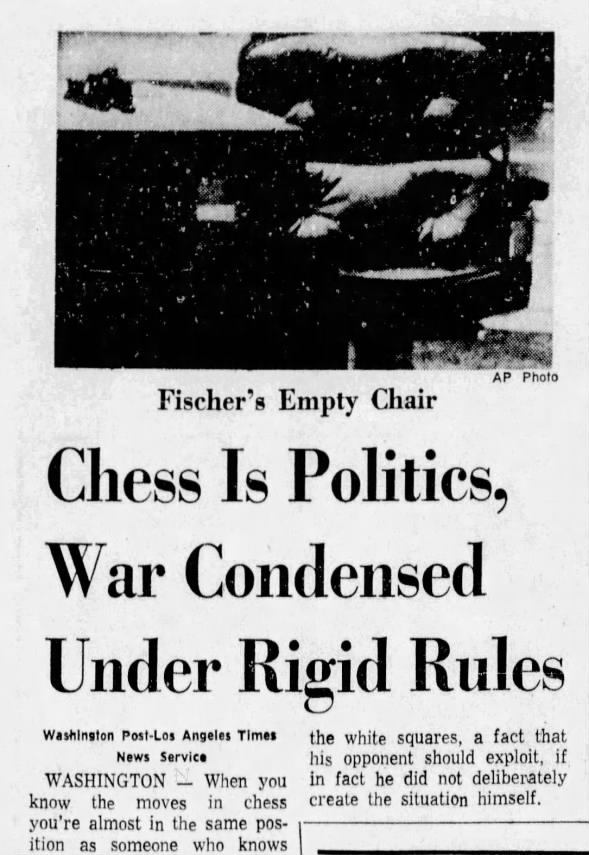The Charlotte Observer Charlotte, North Carolina Friday, July 14, 1972 - Page 7
Chess Is Politics, War Condensed Under Rigid Rules
Washington Post-Los Angeles Times News Service
Washington—When you know the moves in chess you're almost in the same position as someone who knows the functions of the players on a football team: you don't know much of anything.
It is simple enough to learn the moves, but then you discover the real question is “which move when?” Furthermore as in football, you need a special language to talk about it.
Here is a little course in that language.
— Checkmate. The object of the game is to checkmate the enemy king. That is, to be in a position where you are about to move one of your attacking pieces onto his square and he can't prevent it since he is unable to move into or remain in any piece's line of fire.
It is good to remember that chess, probably of ancient Persian origin, represents a war between two kingdoms in which two armies consisting of infantry (pawns), cavalry (knights), fortress outposts or armored elephants (rooks), political intriguers and fifth-columnists (bishops) and a general (the queen) fight each other to get at the opposing king. Though the armies may be decimated, the king itself never is actually killed but is captured, rendered immobile.
—The center. All chess strategy has to revolve around the center one way or another. Once you control the center, you can pivot to either enemy flank, and usually the very first moves of the game, with the center pawns, are attempts to concentrate force on those four central squares.
Sometimes a player will deliberately freeze the center, jamming pawns in there so nothing can get through, and then mount a flank attack. But he must still watch the center for counter-pressure.
—Openings. For centuries, players have been trying various ways of developing, or playing, their pieces quickly to form a coherent attack. Books have been written that simply list hundreds of opening variations. Serious players memorize many of these, saving much time in match play. Often they are named for their inventors or for regions where they were first fashionable.
Openings are very much a matter of fashion. One of the earliest recorded, the 16th-century Ruy Lopez, made a comeback after generations of neglect. (It is rather as if the Los Angeles Rams revived the old Statue of Liberty play.) But it works, for new lines of play have been discovered following the characteristic first three or four moves of this opening.
There are openings called “defenses,” which offer a good reply for black, which plays second, in a given situation. There are openings called “gambits” which involve sacrifice of a pawn to obtain advantage in territory but which are almost unknown in modern chess where the tiniest weakness will be exploited instantly.
—Open or closed game. Different openings have different purposes. Many that start with the king's pawn, for instance, lead to a fast, brutal, “open” game with pieces being exchanged right and left. Bobby Fischer almost always opens with the king's pawn when he has white. On the other hand, many queen-side openings lead to slower development, subtle webs of power, slow strangulation.
—Combinational or positional play. Paralleling the open and closed game are two contrasting styles of play. The combinational, is essentially tactical — featuring a house-of-cards effect that often begins with a surprise sacrifice.
The positional is basically strategic, where a player may actually sacrifice a piece just to gain access to a given square, or to open a vital diagonal for his bishop or file for his rook, or to provoke a weakness in the enemy's pawn structure.
Strong and weak squares. Wilhelm Steinitz, an early world champion who developed a theory of strong and weak squares, but all you need to know for now is that if a player has lost his white bishop, for example, or has several pawns frozen on black squares where they cannot bear on the white, then clearly that player is weak on the white squares, a fact that his opponent should exploit, if in fact he did not deliberately create the situation himself. ★
 Chess Is Politics, War Condensed Under Rigid Rules 14 Jul 1972, Fri The Charlotte Observer (Charlotte, North Carolina) Newspapers.com
Chess Is Politics, War Condensed Under Rigid Rules 14 Jul 1972, Fri The Charlotte Observer (Charlotte, North Carolina) Newspapers.com
























